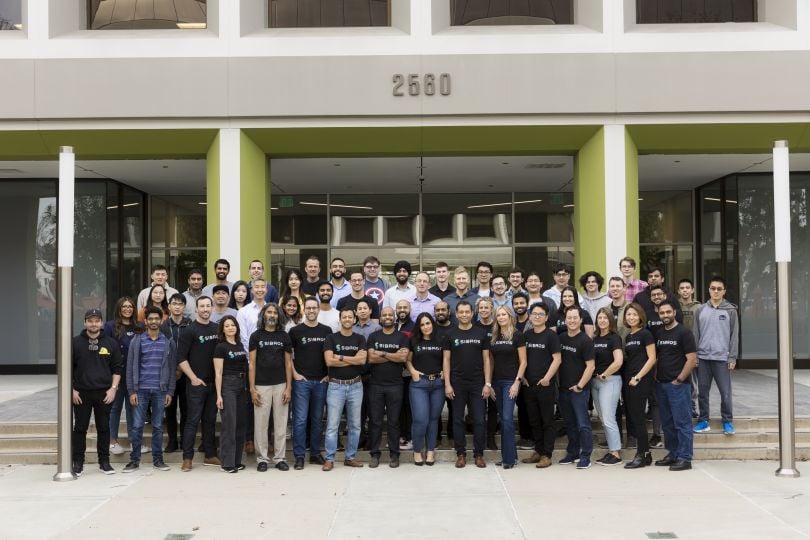Supporting a team has often been compared to cultivating a garden. Like any fern or flower, employees need the proper resources to grow.
When a drought hits, the gardener doesn’t suddenly abandon their plot. Instead, they devote even more time and attention to ensuring their plants have the water and nutrients needed to thrive.
Amid stalled consumer spending and surging layoffs, the tech industry is facing a dry spell of its own. Now more than ever, it’s critical that leaders invest time, energy and funds into developing their teams’ skill sets and careers.
Built In San Francisco connected with leaders from Paper, Udemy and more to learn how they’re ensuring their people continue to blossom in a challenging climate.
Partnering with schools and communities, Paper provides tutoring for K-12 students at no cost to their families.
In spite of industry turbulence, how is Paper continuing to invest in its people?
At Paper, we recognize that the labor market isn't great and inflation continues to cause hardships for our employees, who are spread throughout the United States and Canada. Paper continues to pay its employees above the 50th percentile and offer a $1,000 learning stipend to all corporate employees.
We also recently rolled out mental health benefits for more than 3,000 part-time tutors at no cost to them. This is on top of the full slate of benefits that we offer to full-time employees and the retirement plans (with company matching) that we offer to all full- and part-time employees.
Despite the turbulence we're seeing in the tech industry, we have not had to scale back our benefits and perks.
Paper continues to pay its employees above the 50th percentile and offer a $1,000 learning stipend to all corporate employees.”
How does continuing to invest in your people set Paper up for long-term success?
Happy, engaged employees are the key to ensuring that we're able to support the millions of students who use our educational platform. It's so important that we show our employees we value them as much as they value contributing to our mission of boosting students’ confidence on their academic journey.
We believe that listening to and investing in our people will result in longer-tenured employees, a culture of trust and communication, better support for our students and a more robust product offering.
Looking ahead, how do you plan to continue investing in your people?
We recently developed and rolled out a more robust, sophisticated framework for evaluating, leveling and compensating our employees. Our goal is to observe and reward stellar performance as we see it. We continuously monitor multiple industry-leading sources of compensation data to ensure that we're remaining competitive.
On the benefits side, we recently rolled off of our professional employer organization, meaning that we now have the ability to create more flexible benefit plans in the United States based on what resonates most with our employees here.
On top of benefits and compensation, we recently introduced a rewards and recognition strategy and implemented a tool for employees to publicly applaud each other for their incredible work. We run semiannual engagement surveys and will continue to do so. As our team grows, their needs change, so this helps ensure that we're investing in the right areas.
Edtech company Udemy offers online learning and professional development courses.
In spite of industry turbulence, how is Udemy continuing to invest in its people?
One of the biggest investments we can make in our people is helping them continue to learn, especially during turbulent times. We consider learning part of the employee experience, and we create a culture that develops both organizational and individual capabilities.
One of Udemy’s organizational objectives this year is to increase employee learning. We recently “recultured,” or evolved our culture by coming up with 12 behaviors that express each of our five values. Now, we’re building learning paths that help employees develop skills within those behaviors.
As an example, we’re designing a learning experience around one of our key behaviors: having constructive debates to make better decisions. This is umbrellaed under our “always learning” value.
We’re also creating learning themes each quarter that tie into our learning experiences. For this quarter, resilience — surprise! — is our theme. We’ll curate courses online that help build resilience and encourage teams to discuss what they learned together.
We consider learning part of the employee experience, and we create a culture that develops both organizational and individual capabilities.”
How does continuing to invest in your people set Udemy up for long-term success?
Investing in your people is investing in your business. Developing employees’ skills is no longer just nice to have; it’s now part of every contract between employees and their organizations.
A recent McKinsey study highlighted that 87 percent of executives already have or expect to face major skills gaps over the next few years. If investment in skill development is not a continued focus for companies, they'll fall behind.
Investing in your people is a good idea when things are going well, and it’s even more important during challenging times. Investing doesn’t just mean money spent. The best kind of investment is time.
We encourage our managers to have consistent one on ones to check in with employees on their work and, more importantly, how they’re doing. Development conversations are woven into these one on ones, as employees bring challenges to the discussion and seek coaching on addressing those issues effectively.
It’s this investment in our people that helped Udemy seamlessly promote three employees into leadership roles. By investing in these people’s development, we set them up for success when it was time for them to take on more senior roles.
Looking ahead, how do you plan to continue investing in your people?
Learning is an ongoing practice of building skills, experiences and knowledge through our work, not around or on top of it. That means ensuring that both formal and informal learning are connected within the context of the organization.
A form of learning we’re investing more in with our employees and customers is cohort learning. The Ebbinghaus forgetting curve shows how quickly we forget what we learn. When we study on our own, we typically remember a small amount of what we learned after a couple of days. When we share what we learned with others, we remember a bit more of it. When we use what we learned, answer questions about it and add interaction with others, we retain a majority of what we learned.
This shows why cohort learning is so effective. It’s interactive, and employees learn how to apply new skills more quickly when they have opportunities to practice them on the job.

Sibros provides automakers with a platform for data and diagnostics management.
In spite of industry turbulence, how is Sibros continuing to invest in its people?
At Sibros, we are committed to promoting a workplace where employees have the opportunity to grow, whether it is focusing on interpersonal skills — such as effective communication, adaptability and priority management — or honing their career craft.
While other tech companies are making budget decisions due to the recession, we continue to encourage our team to take advantage of their educational stipends to enhance their domain knowledge with development classes, training courses and additional resources such as books and seminars.
How does continuing to invest in your people set Sibros up for long-term success?
When employees feel like their organization and leadership care about their personal growth and development, it makes all the difference. That’s just in the DNA of who we are as a company. Our pillars of success are to make an impact, learn something and have a good time doing it; we wouldn’t be living up to our beliefs if we didn’t keep investing in our people.
Success happens at companies when teams are motivated, people feel that their work is meaningful and employees are supported in advancing, be it personally or career-wise. We want our team to continue to stay engaged and thrive, not just within their role. We want employees to feel like they belong to a workplace where they can nurture their curiosity and dive into topics that interest them.
For Sibros, offering our team members educational stipends is only the beginning. We will continue to build out more resources.”
Looking ahead, how do you plan to continue investing in your people?
For Sibros, offering our team members educational stipends is only the beginning. We will continue to build out more resources — including hosting training programs and personal development courses — to help develop soft skills such as effective communication, adaptability and management fundamentals. It’s important to us to help prime our employees for success and equip our team with the skills they need to rise up to any challenge and face whatever changes come their way.
We want to keep cultivating a culture that encourages team members to create significant connections and broaden their knowledge and abilities. Through these initiatives, we can collaborate, learn from one another and practice new skills together. Making sure that we’re all engaged and spending our time in worthwhile ways makes us more productive and less prone to burnout.
Firework infuses live-stream and shoppable videos into the digital storefronts of brands, retailers and publishers.
In spite of industry turbulence, how is Firework continuing to invest in its people?
We continue to invest in our people in a variety of ways. First, we offer annual learning and development stipends. Second, we assess engagement and enablement through quarterly anonymous pulse surveys. We get candid feedback to continue to improve the employee experience.
Third, we set aside team-bonding and off-site budgets so that teams can get together on a recurring basis. Fourth, we set a budget aside for performance rewards during our annual merit review.
Finally, we continue to invest in our people operations’ global programs function, which is focused on all initiatives to drive engagement, development and retention.
We continue to invest in our people operations’ global programs function, which is focused on all initiatives to drive engagement, development and retention.”
How does continuing to invest in your people set Firework up for long-term success?
All of the above drive engagement, development and, therefore, retention. Turnover and morale issues can be costly to an organization, as they impact productivity.
By focusing on continuous engagement and development, Firework sets us up for long-term success because loyal, engaged workers will want to drive more results for the business.
Looking ahead, how do you plan to continue investing in your people?
Looking ahead, we want to set realistic measurements for global programs so there are budgets and resources allocated toward training and development, team bonding activities and off-sites, and advancement opportunities.
We also set up our organizational structure and total rewards so it continues to motivate, engage and retain our talent.

Mixbook runs a photo book creation and design platform.
In spite of industry turbulence, how is Mixbook continuing to invest in its people?
Mixbook’s people operations team is constantly looking to evolve the employee experience in an ever-changing world. We do this by considering our employee experience as a product that is constantly evolving. We continuously seek qualitative and quantitative feedback from our team and candidates to ensure that we're prioritizing the right features — for example, tools, resources and benefits — that support our team to do and feel their best.
One way we do this is by reviewing our total rewards program annually, which ensures our benefits still meet the needs of current and future Mixbookers. For example, when shifting to a remote-first workforce, we expanded our gym membership offerings to include at-home wellness perks and reimbursements that better aligned with different team members’ needs.
Given that many of those team members were now located in new states, countries and time zones, we recognized how difficult it was to build connections. As a result, in March 2023, we will host our first-ever company retreat, where we plan to bring nearly 100 Mixbookers from around the world together in person.
We continuously seek qualitative and quantitative feedback from our team and candidates to ensure that we're prioritizing the right features ... that support our team to do and feel their best.”
How does continuing to invest in your people set Mixbook up for long-term success?
Mixbook’s people-first approach means that we look to deeply understand our team in order to enable our employees to thrive. At Mixbook, a thriving environment is one where Mixbookers feel energized to collaborate, safe to be innovative and take risks, and see a bright future of possibilities for everything and everyone around them.
This takes building a healthy organizational culture. We rely on various practices and rituals that enable us to connect, build trust and be vulnerable — all with the goal of achieving our mission of empowering creativity and deepening human connection — both with our employees and customers.
Looking ahead, how do you plan to continue investing in your people?
We continue to invest in our culture and in building better foundational tools that empower our team to do strategic and innovative work.
One example of what we’re working on is expanding learning and development offerings to enable more opportunities for “learning in the flow of work.” This year, we’re placing focus on presentation skills across the organization and building in additional coaching and feedback opportunities for folks to better learn and develop skills in that space.
Future investments may also include dedicating time to rebuilding our internal systems for more ease of use by our teams, as well as the continuous improvement of our onboarding program to set folks up for even greater success from day one.














